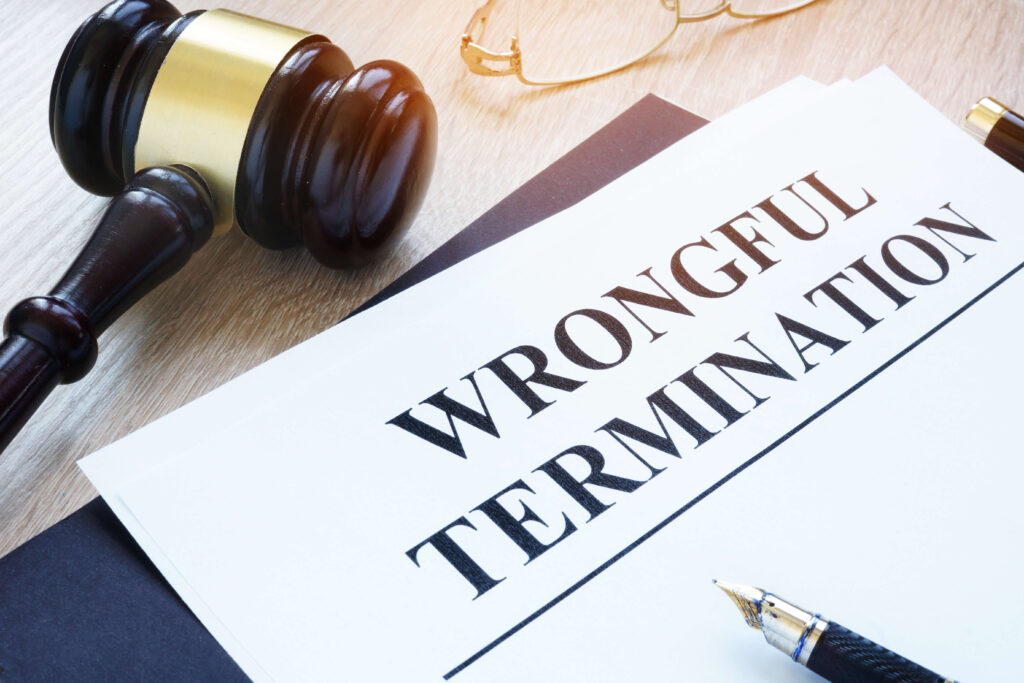The end of employment can happen in many ways. You may decide to quit, your employer may lay you off, the company may go out of business, or your boss may fire you.
The situation often has a legal justification for ending employment. But in some cases, the employer is in the wrong. When this happens, it is wrongful termination.
The concept of wrongful termination in California is tricky. The laws in this area can be a high bar to clear in court. Therefore, it requires the assistance of an attorney familiar with employment law to untangle the details.
Definition of Wrongful Termination
You can define wrongful termination as a conclusion to employment that violates employee rights.
What complicates this is that California is an at-will employment state. “At-will” means that you and your employer have the right to end the employment agreement at any time without any reason.
This law allows you to decide to stop showing up for work without your employer having any legal recourse. However, it also allows your employer to fire you at any time without giving justification.
At-will employment also makes proving wrongful termination difficult because the burden will lie on you. You must prove there was something illegal at the heart of the decision. It is hard to do this when an employer knows what it is doing and covers its tracks.
Areas of Wrongful Termination
Wrongful termination in California and elsewhere typically occurs due to one of four things:
Breaking a Contract
If you have an employment contract, your case can be straightforward. The agreement with your employer lays out the details of when they may let you go. When firing you, if they break the contract, it would be a wrongful termination.
Discrimination
Discrimination occurs when your employer fires you due to a protected attribute. For example, if your employer fires you because you are pregnant, that is wrongful termination.
Retaliation
Retaliation is when your employer fires you because you did something it did not like. For example, if you report your employer to OSHA for a safety violation, your employer cannot use this as an excuse to fire you.
It could also occur due to exercising your rights. For example, if you take time off under the California Family Rights Act, your employer cannot fire you without liabilities.
Violation of Public Policy
This category is similar to retaliation because it often involves an employer responding to your actions.
However, retaliation involves breaking a specific law. A violation of public policy does not because it is typically central to exercising a right.
For instance, if you participate in a protest and your employer fires you, that violates public policy.
California Laws Specific to Wrongful Termination
There are many state and federal laws that protect you from the actions an employer may take.
Discrimination is probably the most protected area at both levels. California’s wrongful termination law provides more extensive coverage than federal law does. Protected classes under California law include:
A few laws that protect employees from discriminatory practices include:
-
Title VII of the Civil Rights Act of 1964
-
California Fair Employment and Housing Act
-
Age and Discrimination Act
-
Equal Pay Act
-
Americans with Disabilities Act
-
-
Healthy Workplaces, Healthy Family Act
Other laws not specific to California provide additional protection against wrongful termination. For example, the Whistleblower Act protects you if you report the unlawful activity of your employer.
Another example is the California Worker Adjustment and Retraining and Notification Act. This legislation protects you from mass layoffs.
The WARN Act applies to employers with at least 75 employees and states they must provide a 60-day notice. It also applies if the employer closes or relocates. Accordingly, you can sue for wages and benefits if your employer does not give a timely warning.
Examples of Wrongful Termination
Wrongful termination can be confusing because there is a fine line between what is justifiable and what is not. It may help to see examples of reasons why your employer may fire you that constitute wrongful termination:
-
Taking whistleblower actions
-
Exercising your rights under the law
-
Filing for workers’ compensation
-
Taking time off when protected by law
-
Refusing to break the law
-
Joining a labor union or participating in activities
Another possibility is a wrongful constructive dismissal. This violation happens when your employer gives you no option but to leave. You can fight this action if you show they did this intentionally because they expect you to quit.
Legal Assistance To Fight Wrongful Termination in California
You have options to fight back when an employer illegally terminates your employment. However, it is not an easy task. Proving your case requires gathering evidence and hunting down witnesses who may not be too excited to testify. You need an attorney who knows how to put together a solid case.
In addition, you have to move fast. The statute of limitations in many circumstances is two to three years. If you try to file your lawsuit after this deadline, then the court will throw it out. The clock starts on the day your employer fires you.
It is well worth going to court if you have a compelling wrongful termination claim. You can recover:
-
Lost wages
-
Lost benefits
-
Back pay
-
-
-
-
Punitive damages
Work With an Experienced California Wrongful Termination Lawyer
You do not have to allow your employer to get away with illegal actions. Hold them accountable for wrongful termination by securing an employment attorney.

